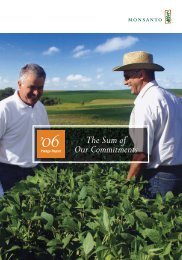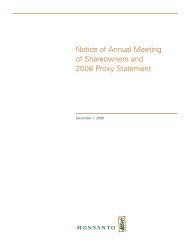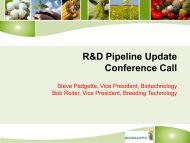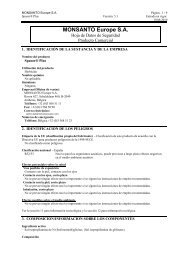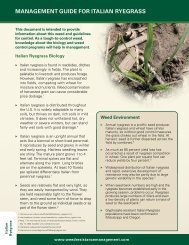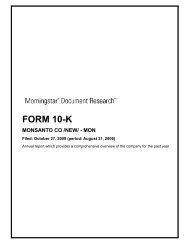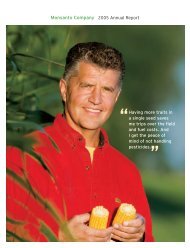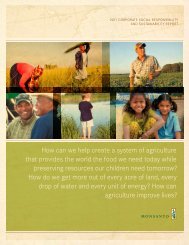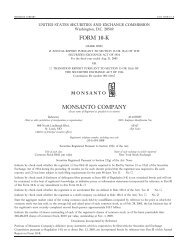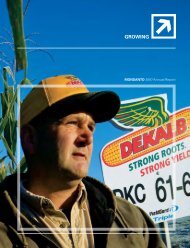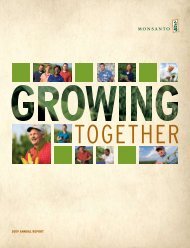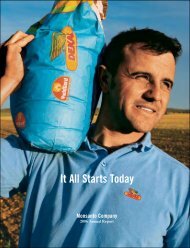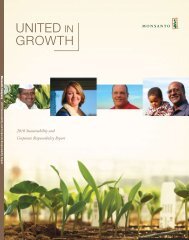You also want an ePaper? Increase the reach of your titles
YUMPU automatically turns print PDFs into web optimized ePapers that Google loves.
One way that <strong>Monsanto</strong> is reaching out to<br />
the changing U.S. agricultural community<br />
is through a project with the Future Farmers<br />
of America (FFA). Through this collaboration,<br />
future agricultural leaders are learning that<br />
cultural awareness will help them become<br />
more successful. <strong>Monsanto</strong> has worked<br />
with the FFA to develop educational materials<br />
about the relevance of diversity in agriculture.<br />
The company also sponsors FFA’s “H.O.<br />
Sargent Award,” which recognizes FFA<br />
<strong>Monsanto</strong> Pledge Award Winner<br />
Dissemination of Information<br />
members, community members, and<br />
teachers who are active in promoting<br />
diversity in agricultural education.<br />
A diverse, inclusive environment at<br />
<strong>Monsanto</strong> fosters participation and<br />
collaboration, and it gives <strong>Monsanto</strong><br />
a competitive advantage in the field.<br />
Furthermore, it is a matter of respect for<br />
our employees and our communities.<br />
With the introduction of biotechnology, <strong>Monsanto</strong> set out to bring new technology<br />
to agriculture on a global scale. In the process, the company was poised to<br />
change substantially the way food and fiber are produced. After quick acceptance<br />
in the United States and opposition in some other parts of the world, the<br />
company realized that it needed to listen better and to communicate more<br />
effectively. In 1999, <strong>Monsanto</strong> people began a proactive, cross-functional effort to promote<br />
broader understanding and acceptance of biotechnology by sharing information on the company’s<br />
technologies and research transparently.<br />
One result has been a computerized knowledge base that supports specialized biotechnology<br />
information sites. The knowledge base, updated daily, contains more than 60,000 documents.<br />
These include daily news stories, scientific papers, presentation materials, analyses, third-party<br />
newsletters, safety reports, technical brochures, and information about special-interest Web sites.<br />
Information provided on these sites makes <strong>Monsanto</strong> people more informed on biotechnology<br />
issues so that they can better answer public questions about biotechnology. In addition, relevant<br />
information is available to other stakeholders, such as external scientists, academics, key<br />
contacts in the food and feed chain, educators, and the public. AgSymbion is one of these<br />
focused Web sites. It has become a core element in <strong>Monsanto</strong>’s university and scientific<br />
outreach programs. More than 1,100 people can access AgSymbion, many of them leading<br />
experts in biotechnology.<br />
The knowledge base helps to fulfill <strong>Monsanto</strong>’s pledge to increase transparency. In addition to<br />
<strong>Monsanto</strong> employees, the scientific, agricultural, academic, and local communities are more<br />
informed about the safety and benefits of <strong>Monsanto</strong>’s research and products because of this<br />
commitment to Internet-based information sharing.<br />
{ MONSANTO COMPANY 2004 PLEDGE REPORT: PAGES 42-43 }



